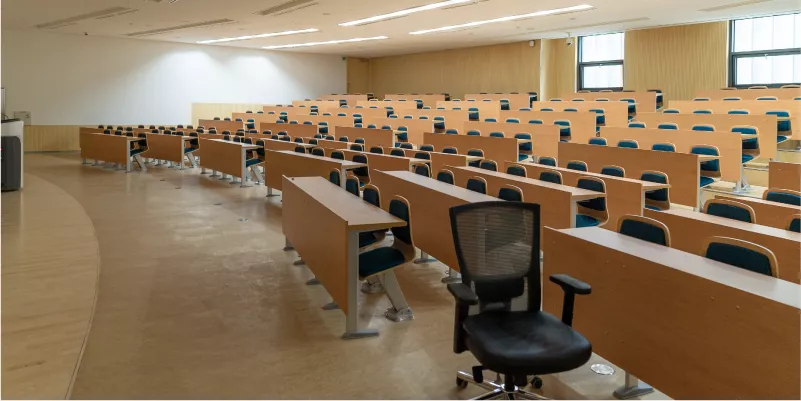COVID-19: Digital exclusion is a reality

When I started to draft this article, I was sitting in my home office. Since, apparently, a lot of other people were using their private broadband connections at the same time – presumably for similar reasons as myself, namely working and learning from home - the internet kept dropping out. I thought about the absurdity of the situation: here I was sitting and wanted to write about digital inclusion and barriers to learning during COVID-19, and I had no access to the internet myself. If there is one thing that the coronavirus crisis has already shown very clearly, it is the self-evident assumption in professional life and education that everyone has a good internet connection at home, as well as electronic devices on which all kinds of new apps run smoothly and you can use webinar and conference software without any problems. What the crisis has also shown: this picture does not correspond to reality.
Digital exclusion is a reality
“We can see that some learners are digitally excluded, and may not have access to IT equipment or the internet to be able to participate in online learning”, says Alex Stevenson, Head of English, Maths and ESOL (English for Speakers of Other Languages) at Learning & Work Institute in the UK. “Some providers in the UK are experimenting with schemes to lend learners laptops and computers that are currently unused in adult education centres, or provide learners with support to meet the costs of mobile data so that they can afford to access online content.”
However, this rapid response to support learners from disadvantaged communities does not correspond to the average experience in other countries. While in some countries, such as Finland, governments provided additional financial support to the adult learning sector to shift learning online and keep learners in courses, most other parts of Europe suddenly found themselves in serious financial difficulties.
"The problem arises in cases where funding is linked to the number of learners present in person or to monitoring the duration of their presence in educational institutions," says Zvonka Pangerc Pahernik from the Slovenian Institute for Adult Education and Slovenian coordinator for the European Agenda for Adult Education. “Therefore, negotiations with ministries and other relevant bodies were necessary in order to provide flexible solutions.”
Digital exclusion is not just a question of the lack of access for learners to adequate internet connection and electronic devices. The digital divide is also reinforced by the side of learning provision and the way in which adult education is funded.
Funding comes from a variety of sources, including project funding, course fees and - in some countries - public programme funding for learning programmes targeted at specific groups of learners. Funding is often provided through a formula based on the number of learners and the number of hours present in learning institutions. Under the rules of most public funding sources, overhead costs cannot be covered, which means that the digitisation of adult learning must be funded elsewhere - money that many adult learning organisations do not have. Organisations working mainly in the field of basic and life skills with adults who are furthest from learning also tend to be those with the least resources to build up an adequate technological infrastructure within their institutions, not to mention lending computers and other equipment to learners. As a result, many adult education providers were inadequately equipped both in terms of technological infrastructure and the online teaching skills of educators, when the crisis started.

At the same time, the digitisation of adult education, especially when working with vulnerable groups, was viewed critically by providers, as it meant changing entire educational concepts in an area where personal contact and social interaction are seen as crucial.
The coronavirus pandemic and subsequent lockdown in many countries, however, did leave little choice to providers, where the only alternative to digital learning was no learning at all.
"In Austria, in the first four weeks after the closure of the educational institutions, the initial resistance quickly turned into a real wave of digitisation across the educational provider landscape," says Gerhard Bisovsky, Director of the Association of Austrian Adult Education Centres (VÖV). The rapid digitisation was possible thanks to the support of the federal association: it immediately started to offer training courses on the technology of online tools and on didactic aspects of digitally supported learning in general and on subject didactics. "We are now also working on the development of a digitisation strategy," says Gerhard Bisovsky. Other organisations from Europe report very similar stories. When the funding rules for European programmes, especially Erasmus+ and ESF, but also for national and regional funding programmes, were changed to take account of the new circumstances and learning could be moved online, adult learning providers were able to start digitising.
"In the UK, this meant adapting the curriculum model to online delivery, for example by having shorter but daily lessons instead of a longer one per week," says Alex Stevenson. New learning models like this can help learners find a new learning rhythm and maintain commitment and motivation in online learning.
What is lost, and what can be gained
Still, while adult education institutions put great effort into shifting their learning programmes online, evidence from the providers shows that the rapid transition to digital learning has resulted in learners dropping out. Ben Hendriksen, Advocacy Lead of AONTAS, the Irish adult education association, says: “As a membership organisation we are always listening to the experience of organisations around Ireland. In the first weeks of the lockdown we were hearing reports from some of our member organisations that as little as 1 out of every 4 learners were continuing to engage in learning online. This gives us a glimpse into what is possible and what is being lost, especially if we look at outreach to people furthest removed from learning."
Although the situation is not so bleak in all countries, adult learning organisations across Europe report that the number of learners has declined since the beginning of the crisis and lockdown. Drop-outs include not only learners who simply do not have access to the internet or a computer at home, but also people who do not have sufficient digital skills, and parents who had to look after their children during the lockdown and, for example, support them in learning.
“Providers in the UK have become very inventive in order to keep families learning, for example using software that hosts a range of fun and educational activities parents can use with their children to support home schooling. New content is added regularly and learners receive alerts via WhatsApp to encourage them to engage with the resources,” says Alex Stevenson.
Communication via telephone, WhatsApp and other similar services have proven central to reaching out to learners from vulnerable backgrounds.
The role that adult education plays in involving people in social networks should not be underestimated, and during the crisis this role was brought even more to the fore.
Zvonka Pangerc Pahernik calls this the “therapeutic dimension” of adult learning. Not everywhere have adult learning providers been able to move learning provision online, and learners have not always been able to devote their time to online learning where it was available. But even then, many adult learning organisations tried to maintain their links with learners at risk of social exclusion through telephone calls, text messages and chat groups in messenger services. Some providers also partnered up with healthcare and social service providers in order to reach out to the most vulnerable groups. “They started to offer very short online courses intended to support mental wellbeing, such as mindfulness, craft activities and other activities that keep people engaged,” says Alex Stevenson.
Another great example for engaging people in learning is ‘Keep London Learning’. “This initiative has been organised by a group of providers in central London. It is a simple website that enables Londoners to immediately see what online courses are available in their area and across the city. The website also recommends other links to enable Londoners to find employment and retraining opportunities; to contribute to their communities and reduce isolation, to keep well, fit and healthy; to support their families; and to continue to develop those essential skills (communication, critical and creative thinking, confidence etc.) that Londoners will need to thrive over the coming months and years,” says Alex Stevenson.

Finding a new balance between digital learning and the social dimension of adult education
What already seems very clear is that the coronavirus crisis will have a lasting impact not only on the labour market and other parts of the economy but also on learning provision. Digital learning will play a more important role in the foreseeable future. For adult learning providers this means striking a good balance between the dimension of social inclusion of learners through face-to-face learning and adaptation to changing circumstances. Initiatives like "Keep London Learning" try to understand digital learning and social integration and interaction not as two opposites, but as something that goes hand in hand. The non-formal adult learning sector, while facing particularly difficult financial conditions, has shown its resilience to the crisis by going above and beyond to provide flexible, learner-centred solutions to keep learners in education and reach the most vulnerable groups.
Raffaela Kihrer has worked in EU adult education and lifelong learning since 2013. As Head of Policy at the European Association for the Education of Adults (EAEA), she promotes the values of non-formal adult education and learning through advocacy and information work at the European level.





Moim zdaniem nauka zdalna